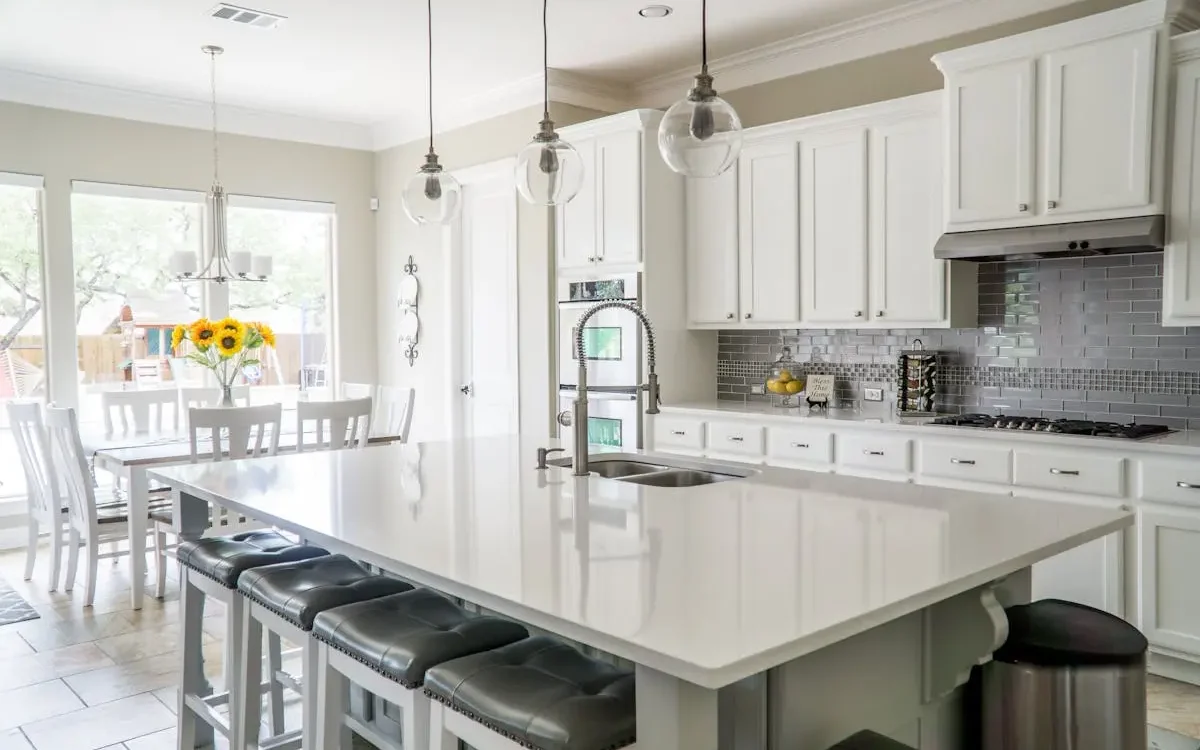Creating your dream kitchen is one of the most rewarding home improvement projects you can undertake. Whether you love cooking or just enjoy a cozy space, a well-designed kitchen can change your home. In this guide, we will help you design and build the perfect kitchen. It will be tailored to the unique needs and tastes of homeowners in New Jersey.
Assessing Your Needs and Budget
The first step in creating your dream kitchen is understanding what you truly need. Consider how you will use your kitchen every day. Think about which appliances you need. Also, decide on the best layout for your space. Equally important is setting a realistic budget for your project and sticking to it.
Consider your cooking habits and lifestyle. Are you an avid chef who needs ample counter space and state-of-the-art appliances? Maybe your kitchen is the main spot for family gatherings. It needs a large dining area and plenty of storage for snacks and drinks. Customizing your design to fit your needs makes sure your new kitchen is both useful and fun.
Next, establish a comprehensive budget. Begin by determining how much you’re willing to spend and then allocate funds to different aspects of the renovation. Differentiate between must-haves and nice-to-haves, and make sure to include a contingency fund for unexpected expenses. This will help you manage your finances effectively and avoid any surprises down the road. Finding the right balance between quality and budget is key to a successful renovation project.
There are numerous resources available to assist with budgeting, including online calculators and guides. This guide provides clear insights into costs and budgets for kitchen remodels. It helps you plan more efficiently. Remember, the key to a successful renovation is thorough planning and realistic expectations.
Choosing the Right Style and Layout
The style and layout of your kitchen should reflect your personal taste as well as practical considerations. From modern and minimalist to rustic and cozy, the possibilities are endless. Consider factors like available space, natural light, and how the kitchen will flow with the rest of your home.
Start by exploring different kitchen styles to identify what appeals to you. You may like the clean lines and smooth finishes of a modern kitchen. Or, you might prefer the warm, cozy feel of a traditional kitchen with custom cabinets and vintage fixtures. Take your time to gather inspiration from magazines, home improvement websites, and kitchen renovation blogs.
Once you’ve settled on a style, it’s time to think about the layout. A well-planned layout maximizes efficiency and enhances the usability of the space. Popular kitchen layouts include the open concept. In this design, the kitchen flows easily into the living and dining areas. This layout is great for social gatherings. A U-shaped or galley layout may work better in smaller spaces. It offers plenty of counter space and easy access to all kitchen areas.
To ensure your layout works best for your space, consider enlisting the help of a professional designer. Many homeowners in New Jersey have succeeded by working with award-winning designers like Featured Kitchen and Bath. They offer custom solutions that fit your vision and space needs.
Selecting Materials and Finishes
Material selection plays a critical role in both the aesthetics and functionality of your kitchen. Choose durable, high-quality materials for countertops, cabinetry, and flooring that can withstand daily wear and tear. New Jersey’s climate can affect your material choices. It’s important to choose options that can handle humidity and temperature changes.
For countertops, materials like quartz and granite offer a blend of beauty and practicality. Quartz is popular for its durability and low maintenance, making it an excellent choice for busy kitchens. Granite, with its natural veining and colors, adds a touch of luxury and uniqueness. Both materials come in different finishes, from honed to polished. This lets you customize the look to match your kitchen’s style.
Cabinetry is another major consideration. Solid wood cabinets have a classic look. They can be customized with different stains and paints. This allows you to match your color scheme. Alternatively, laminate or thermofoil cabinets are cost-effective options that come in a wide range of colors and patterns. Combining different materials, such as wood and glass, can create a distinctive and modern look in your kitchen.
Flooring should be both stylish and resilient. Options like tile, hardwood, and luxury vinyl plank offer durability and a variety of aesthetic choices. For example, more people are choosing luxury vinyl plank. It is popular because it resists water and is easy to maintain. Additionally, consider using materials that complement other elements in your kitchen for a cohesive design.
Incorporating Smart Features
Modern kitchens often include smart features that make cooking and entertaining easier. From smart appliances to lighting and climate control systems, integrating technology can enhance your kitchen’s efficiency and convenience.
Smart appliances, such as refrigerators with touchscreens, voice-activated ovens, and programmable coffee makers, can significantly improve your kitchen’s functionality. These appliances often come with energy-saving features, helping you reduce your household energy consumption. Additionally, smart home systems allow you to control lighting, heating, and even security from your smartphone, adding a layer of convenience and safety.
Voice-activated assistants, like Amazon Alexa or Google Home, can be integrated into your kitchen to control various smart devices. Imagine adjusting your lighting to suit the mood with a simple voice command or setting timers and alarms while your hands are busy with meal prep. These technologies make daily kitchen tasks more seamless and enjoyable.
Engaging smart lighting solutions, like motion sensor lights and programmable LEDs, can elevate the ambiance and functionality of your space. Consider installing under-cabinet lighting for task illumination or using colored LEDs to set the mood for different occasions. For instance, these trends show that integrated lighting features are becoming increasingly popular for their practicality and aesthetic appeal.
Hiring the Right Professionals
A successful kitchen renovation often requires the expertise of professionals. Hiring the right contractor, designer, and other tradespeople can make a significant difference in the outcome of your project. Ensure you check references, look at past work, and choose professionals who understand your vision.
When searching for the ideal contractor, consider their experience, reputation, and portfolio. Word-of-mouth recommendations from friends and family can be invaluable, but also take the time to read online reviews and testimonials. Sites like Garden State Renovations provide insights into various phases of the renovation process, offering tips and highlighting the importance of choosing skilled professionals.
Designers bring creativity and expertise to the table, ensuring that your vision is translated into a functional and beautiful space. They can help with everything from space planning to selecting materials and finishes. For those wanting an award-winning touch, consider firms like Featured Kitchen and Bath, known for their exemplary design and customer service.
Finally, a transparent and communicative relationship with your contractor is essential. Regular updates, clear timelines, and open lines of communication will help manage expectations and avoid misunderstandings. Look for professionals who provide detailed contracts outlining the scope of work, timeline, materials, and budget. This way, you can navigate your renovation project smoothly and confidently.
Navigating Local Regulations and Permits
Home improvement projects in New Jersey, like anywhere else, need to comply with local building codes and regulations. Understanding these requirements and securing the necessary permits is essential for a smooth renovation process. Make sure you’re informed about any local restrictions or guidelines that could impact your project.
Start by consulting with your local building department to determine what permits are required for your renovation. This might include permits for structural changes, electrical work, plumbing, and more. Each municipality has its own set of rules, so it’s important to familiarize yourself with the specific requirements in your area.
Working with a professional contractor can ease the navigation of permits and regulations. Experienced contractors often have a good understanding of local building codes and established relationships with permitting authorities, which can expedite the approval process. They can also help you ensure that your project adheres to all legal and safety standards.
Familiarize yourself with resources that offer comprehensive guides on kitchen renovations and local regulations, such as this guide, which delves into the intricacies of remodeling projects in New Jersey. Being well-informed will help prevent costly fines and delays, ensuring a smooth and compliant renovation process.
The Perfect Kitchen Awaits
Designing your dream kitchen is all about understanding your needs and bringing together elements that speak to your personal style. With careful planning, the right materials, and a touch of creativity, you can create a beautiful, functional space that enhances your daily life. Whether you’re doing a complete overhaul or just a few updates, remember that the process should be enjoyable and reflective of your unique vision. Happy renovating!







